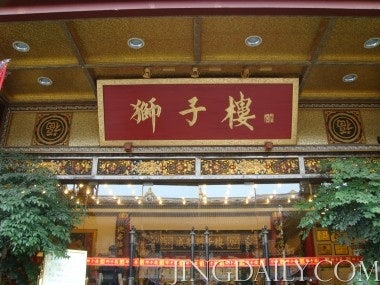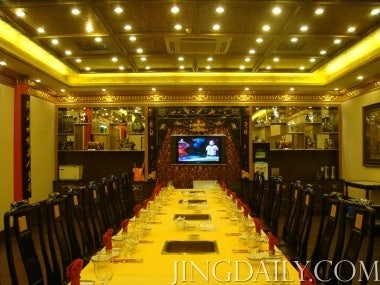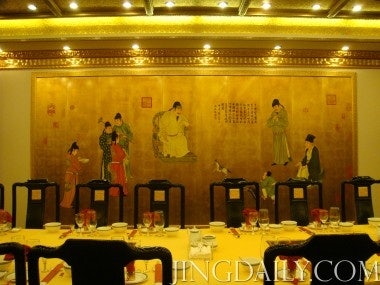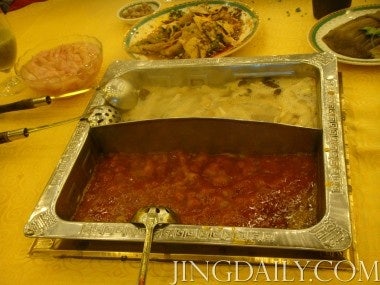High-End Cuisine In China Not Limited To European Or Japanese Eateries#

Lion Pavilion
While Chengdu, capital of southwest China's Sichuan province, has been more recently associated with a booming luxury market and burgeoning interest in wine, the city is still most readily associated with its hot and spicy cuisine, which UNESCO recognized last year by designating Chengdu its first-ever Asian "City of Gastronomy." Indeed, Chengdu, for all its increasing economic prowess, remains very much a haven for foodies. The slower, more leisurely pace of life enjoyed by Chengdunese, and their more social nature, is reflected in some of their greatest interests: tea houses, Sichuan opera, mahjong, and, of course, food.
Chengdu cuisine can be described as ever-changing, but among its perennial favorites is huǒ guō (火锅), or "hot pot." Of the city's hundreds (if not thousands) of hot pot restaurants, which range from lavish banquet-style venues to street-side stalls, Lion Pavilion (Shīzi lóu, 狮子楼) ranks as one of Chengdu's highest of high-end eateries. One of three Sichuan restaurants given "Chinese Famous Brand" (中国名牌) distinction, along with fellow hot pot hotspot Huang Cheng Lao Ma (皇城老妈) and Baguo Buyi (巴国布衣), Lion Pavilion touts its integration of local culture and history as well as its blazingly hot broth.
Recently, Jing Daily analyst Betty Chen visited a Lion Pavilion location on Chengdu's Qintai Street, one of the most popular sightseeing areas in the city, where we spoke with branch deputy manager, Ms. Hu, about Lion Pavilion's history, business operations, interior design and brand-building strategies (Translation from the original Chinese):
Jing Daily (JD): Can you tell us a little about Lion Pavilion?#
Manager Hu (MH):#
Interestingly enough, the Lion Pavilion company was originally formed by our current chairman Yang Zuwei's father to produce mosquito nets. Later, though, the company was transformed into a high-end Sichuan cuisine and hot pot restaurant brand. Since then, we've worked to turn hot pot, which originally was a common part of people's daily diets, into something more elegant.
Although the origin of hot pot can be traced to Chongqing, in Chengdu we've taken it to another level, and in recent years many "five-star" hot pot restaurants have appeared on the scene. However, we can say that Lion Pavilion was the first of these chains in Chengdu.

Interior of Lion Pavilion's Qintai St. location
JD: How do you try to position yourself in Chengdu's restaurant industry?#
MH:#
We really focus on exclusivity and quality, and position ourselves based on our food, decor and service. We're trying to create a five-star atmosphere. Aside from hot pot, some Lion Pavilion branches serve Sichuan cuisine classics, but our branch mostly serves hot pot.
JD: How many branches do you have in Chengdu?#
MH:#
Lion Pavilion has a total of six branches in Chengdu, of which four serve hot pot, including the Qintai branch (琴台店), Wannian branch (万年店), Jinnan branch (金南店) and Jinsha branch (金沙店). The Wannian branch and Jinnan branches both serve hot pot as well as Sichuan cuisine. Later this year, we'll open another branch in Huayang.
JD: Can you give us a sense of your customer base?#
MH:#
Most of our consumers are from the business sector or government departments, CEOs or senior officials. They mainly invite guests who are visiting Chengdu and let them enjoy authentic hot pot here.
JD: Chengdu's hot pot and Sichuan cuisine market must be pretty fiercely competitive, so what would you say is your competitive advantage?#
MH:#
One of Lion Pavilion's competitive advantages is our decor. The antique and glided decor is unique among restaurants in Chengdu. Also, we do staff training each month and conduct regular assessments to keep improving our customer service standards. We also do personal things like proposing a toast when a customer is celebrating a birthday, a holiday or a special event. We try to make our customers feel at home and see us as friends or family.

Murals depicting the lives of Song Dynasty emperors line the walls
JD: So what would you say is the most difficult part of the Chengdu restaurant industry?#
MH:#
In Chengdu, the restaurant industry is very hot, so now lots of restaurants of various sizes are starting up, many of which are trying to tout themselves as "high-end." Many restaurants that previously only served Jiācháng cài (家常菜, homestyle food) are starting to put hot pot on their menus.
JD: How do you plan to compete with these new high-end hot pot restaurants?#
MH:#
Based on quality, basically. We highlight the fact that our chefs have created hot pot broth that's more refreshing and satisfying than most, which tend to be oily and dense. Even though our hot pot's spicy, it won't give you a stomachache. We've actually won awards for our hot pot broth.
JD: How about your pricing strategy?#
MH:#
Our price strategy's not really clearly defined, since the food on our menu ranges from basic to elaborate. We'll cater to our customers needs, though, in terms of adjusting the dishes for their tastes or group.
JD: You said your decor is a competitive advantage. Can you tell us a little about that?#
MH:#
Well, the interior design of this Qintai branch is inspired by the Song Dynasty (960-1279 CE -- JD). The restaurant has a golden tone throughout, embodying the royal style from that time, and features a good deal of hand-carved hardwood and traditional lacquering. We also have several traditional paintings of Song Dynasty emperors, which are enhanced by gold leaf.

The bubbling hot pot broth is set within the table
JD: Where did this design concept come from?#
MH:#
Mostly from the tastes of our company chairman, who's really interested in the culture of the Song and Tang Dynasties, and is specifically fascinated by the characters in"Water Margin" (水浒传), one of the Four Classic Chinese Novels.
All of the names on our private dinning rooms, including the inscriptions on couplets and plaques, derive from the Song Dynasty.